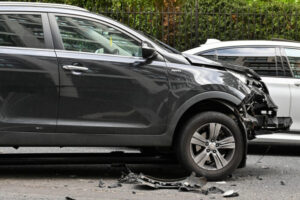Can I Sue for Emotional Distress After a Car Accident?

Many people associate car accident injuries with physical injuries like broken bones, sprains, brain injuries, and whiplash. Yet car accidents can also cause mental and emotional trauma that can affect a car accident victim for months, years, or their entire life.
If you or a loved one suffered physical and emotional injuries after a car accident, you can sue for negligent infliction of emotional distress. Our Riverside car accident lawyer can help you pursue compensation for your emotional distress damages. We offer a free consultation and no upfront legal fees.
What Is Emotional Distress?
Emotional distress, also referred to as mental anguish, is a type of non-economic damage that compensates you for the psychological injuries you experienced as a result of an accident. It may include symptoms such as:
Anxiety

Many car accident victims feel new or increased anxiety after a car crash. Victims may feel a sense of dread or fear every time they are driving or in their daily routine. Unfortunately, without the proper treatment, the anxiety may continue to get worse. Getting the proper treatment to manage anxiety can help victims feel comfortable on the road again.
Depression
Witnessing a traumatic event or being the victim of a serious accident can lead a person to develop major depressive disorder, also known as depression. Symptoms of depression are feelings of sadness or hopelessness, loss of interest or enjoyment of normal life, sleep disturbances, and reduced appetite. Suffering from a physical injury can lead to depression, as victims often feel frustrated or helpless.
Insomnia
Insomnia is a common sleep disorder that can happen after a car accident. Symptoms include trouble falling asleep, staying asleep, or getting a good night’s sleep. Insomnia can affect a person’s quality of life, mood, health, and work performance. Car accident victims may suffer from short-term insomnia, which can last for days or weeks, or long-term insomnia.
Post traumatic stress disorder (PTSD)
PTSD after a car accident is surprisingly more common than people think. It can affect the person directly involved in the accident or someone who witnessed it. Symptoms of PTSD include recurring flashbacks, having difficulty concentration or falling asleep, feeling irritable or tense, feeling isolated, and more.
Emotional and psychological injuries like PTSD require ongoing mental health treatment, medication, and therapy, which can be costly and time-consuming. If you have experienced any of the above symptoms, it is important to speak with a mental health professional as soon as possible.
How to Prove Emotional Distress
Whether you are a direct victim or a bystander affects what you have to prove to establish a claim for negligent infliction of emotional distress.

If you were a direct victim of a personal injury, such as a car accident, you must prove the following in order to file an emotional distress claim and seek compensation:
- The other party was negligent or reckless
- You suffered emotional distress
- Your emotional distress resulted in damages
To prove these elements, you will need to gather and present strong evidence, such as:
- Police reports
- Witness statements
- Photos and videos of the scene
- Medical records and bills
- Expert testimony
- Accident reconstruction
When you sue for emotional distress from a car accident, you are suing for non-economic damages. These damages are intangible, non-monetary losses. Other examples of non-economic damages are pain and suffering and reduced quality of life.
Emotional distress can also affect your ability to work. In these cases, your claim can include lost income or loss of earning capacity. If you suffer from a condition like PTSD, your claim can also include compensation for your psychiatric treatment and medication.
In California, you can only recover NIED damages if you also suffered a physical injury in the accident. This is known as the “impact rule” or the “physical injury rule”. If you did not suffer any physical injuries, you cannot sue for emotional distress under NIED.
Intentional Infliction of Emotional Distress (IIED)

In rare cases, a personal injury victim may sue for Intentional infliction of emotional distress (IIED). To prove IIED, you need to show that:
- The other party acted especially reckless, such as driving under the influence, road rage, or deliberately hitting your vehicle
- The other party intended to cause you emotional distress or acted with reckless disregard of the possibility of causing you emotional distress
- The other party’s conduct caused you severe emotional distress
- Your emotional distress resulted in damages, such as medical bills, lost wages, or pain and suffering
Unlike NIED, you do not need to prove a physical injury to recover IIED damages. However, IIED claims are rare and difficult to prove, as you need to show that the other party’s conduct was beyond the bounds of decency and that your emotional distress was severe and not just mild or moderate.
Contact an Experienced Car Accident Lawyer in Riverside

If you have suffered or witnessed emotional distress or severe physical injuries after a car accident, you should first seek the help of mental health professionals and get treatment. Then, you may want to reach out to an experienced personal injury attorney if negligence caused your injury. While filing an emotional distress claim on your own is possible, for more serious injuries and extensive property damage, you may need the help of a qualified attorney.
At Sycamore Accident Lawyers, our legal team goes to bat with the insurance company to obtain maximum compensation for injured clients of auto accidents and workers’ compensation. To schedule a free consultation, contact our Riverside law firm at (909) 703-2420 or fill out this quick online contact form so we can begin your legal claim.